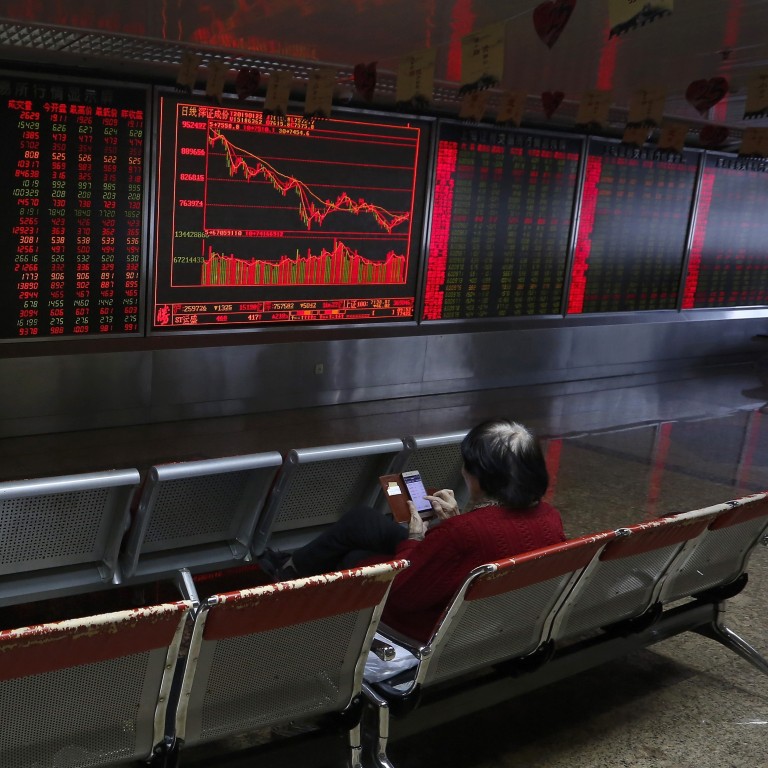
US-China trade worries weigh on Hong Kong, China stock markets
- Jiayuan – which plunged 81 per cent last week – confirms forced sale of 93.62 million shares of chairman and his wife. Trading still suspended.
- Shares of solar farms developer China Singyes plummet on news of possible sale of new and existing shares
China and Hong Kong stocks bounced between tiny losses and gains, as traders weighed worries that the US-China trade war may drag on against fresh steps by Beijing to boost fiscal spending to support the economy.
By Wednesday’s close, the Hang Seng Index was flat at 27,008.20, while the Hang Seng China Enterprises Index gained just 0.17 per cent, or 17.55 points, to 10,631.03.
On the mainland, the Shanghai Composite pared losses to edge up 0.05 per cent, or 1.30 points, to 2,581.00, but the CSI 300 fell 0.07 per cent, or 2.27 points, to 3,141.05.
Pushing up sentiment were comments by Chinese finance ministry officials on Wednesday that they will further cut taxes and fees for small firms.
But that wasn’t enough to offset market worries about slowing momentum shown in recent China economic data as well as the International Monetary Fund’s downbeat forecast for global growth. Markets were also down because of the overnight rout in US equities, with the three leading American benchmarks all falling by at least 1 per cent.
“Everybody expected the market to be down quite a bit [to track US losses] but surprisingly it stayed put,” said Louis Tse Ming-kwong, managing director of VC Asset Management. “Of course there is still some concern over what is going to happen. After such strong gains for the last couple of weeks now it is level on 27,000, see-sawing.”
“The strong resistance on 27,260 may have a double top now. If we can technically go through that with substantial turnover, then we are looking at 28,600 or even a bit more. But can we do that before the Lunar New Year? I doubt it very much.”
The biggest focus in markets continues to be US-China trade talks. They begin anew next week in Washington, but the clock is ticking as the March 1 deadline nears on the 90-day truce.
The Financial Times reported that the US had cancelled preliminary meetings with Chinese officials, causing some turmoil, but US presidential adviser Lawrence Kudlow denied it was true.
Canada’s foreign minister Chrystia Freeland, meanwhile, told the Globe and Mail that the US will continue with a formal extradition from Canada of Huawei executive Meng Wanzhou. The deadline for their request to be filed is January 30. Since her arrest on December 1, China has demanded her release, detained two Canadian citizens and sentenced a third man to death for drug smuggling.
On Tuesday, China’s Foreign Ministry once again called for Meng’s release.
The Huawei drama has weighed on smartphone makers, suppliers and markets generally, by underscoring the tensions between China and the US and some other countries over the next generation of technology and fears of how it might be used for spying.
Well-known mobile suppliers Sunny Optical and AAC Technologies lost 3.15 per cent to HK$70.80, and 0.99 per cent to HK$45.10, respectively, in Hong Kong.
Telecommunications, however, rose 1.61 per cent by the close to make it the largest gainer among sectors, led by China Unicom which climbed the most on the Hang Seng. It ended up 4.27 per cent to HK$9.04 as investors, according to Tse, look to 5G.
The biggest mover on the mainland was coal producer Wintime Energy. The best performer on the CSI 300 Index with gains exceeding 60 per cent in 2019, fell as much as 9.8 per cent to 1.94 yuan in Shanghai. A sell-off of about 535 million shares, according to data compiled by Bloomberg, was spurred by an overnight exchange filing that the company had defaulted on bond repayments of 1 billion yuan (US$147.2 million) maturing on Tuesday.
Meanwhile, Jiayuan International Group remained suspended from trading on Wednesday morning. The property developer suddenly plunged 81 per cent last Thursday. In its latest filing with the Hong Kong stock exchange, it confirmed a forced sale of 93.62 million shares of chairman Shum Tin Ching and his wife, Wang Xinmei.
According to sources, the company had planned to meet investors today but the meeting was cancelled last night. Jiayuan did not respond immediately to a request for comment.
“It was wise for the company to suspend their shares so it won’t go further down, stops the bleeding,” said Tse. He noted China Singyes Solar Technologies Holdings’ dive on Wednesday after resuming trading, as an example of what could potentially happen to Jiayuan.
Guangdong-based solar farms developer China Singyes was trading down 48.37 per cent to HK$1.11, at its lowest level since February 2009. On Tuesday, the company issued a stock exchange filing that it may sell existing and new shares to Shuifa Energy Group, a Shandong water supply, natural gas distribution logistics and solar farms investment company, from current owner Strong Eagle Holdings. Trading had been halted since October 15, 2018, pending the announcement, and resumed on Wednesday morning.
Yurun Food Group, a Chinese mainland based meat producer, surged 28.92 per cent to HK$1.07 in Hong Kong, after the company announced its missing chairman Zhu Yicai returns home on Tuesday night, after missing for more than three years since 2015.

